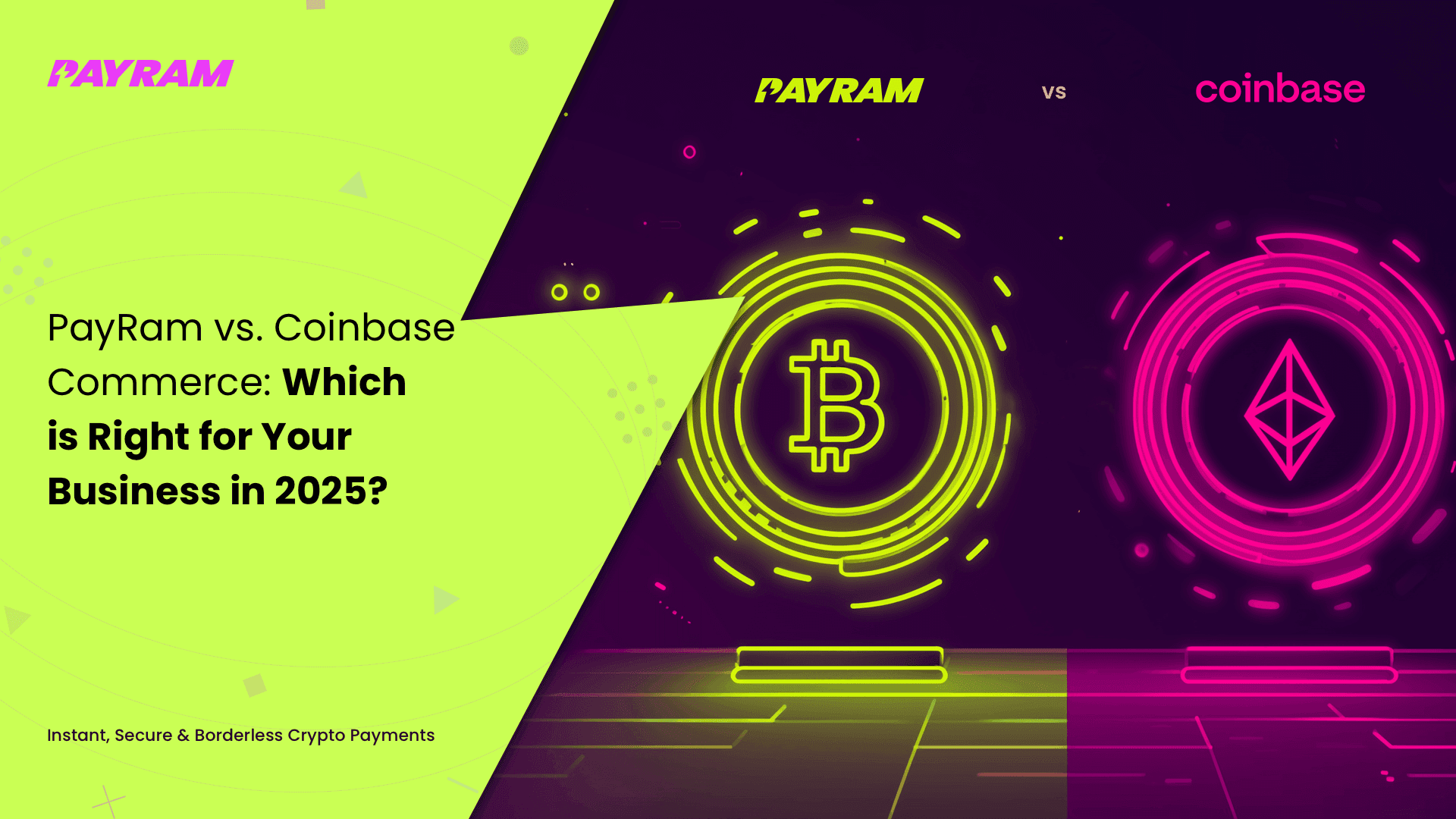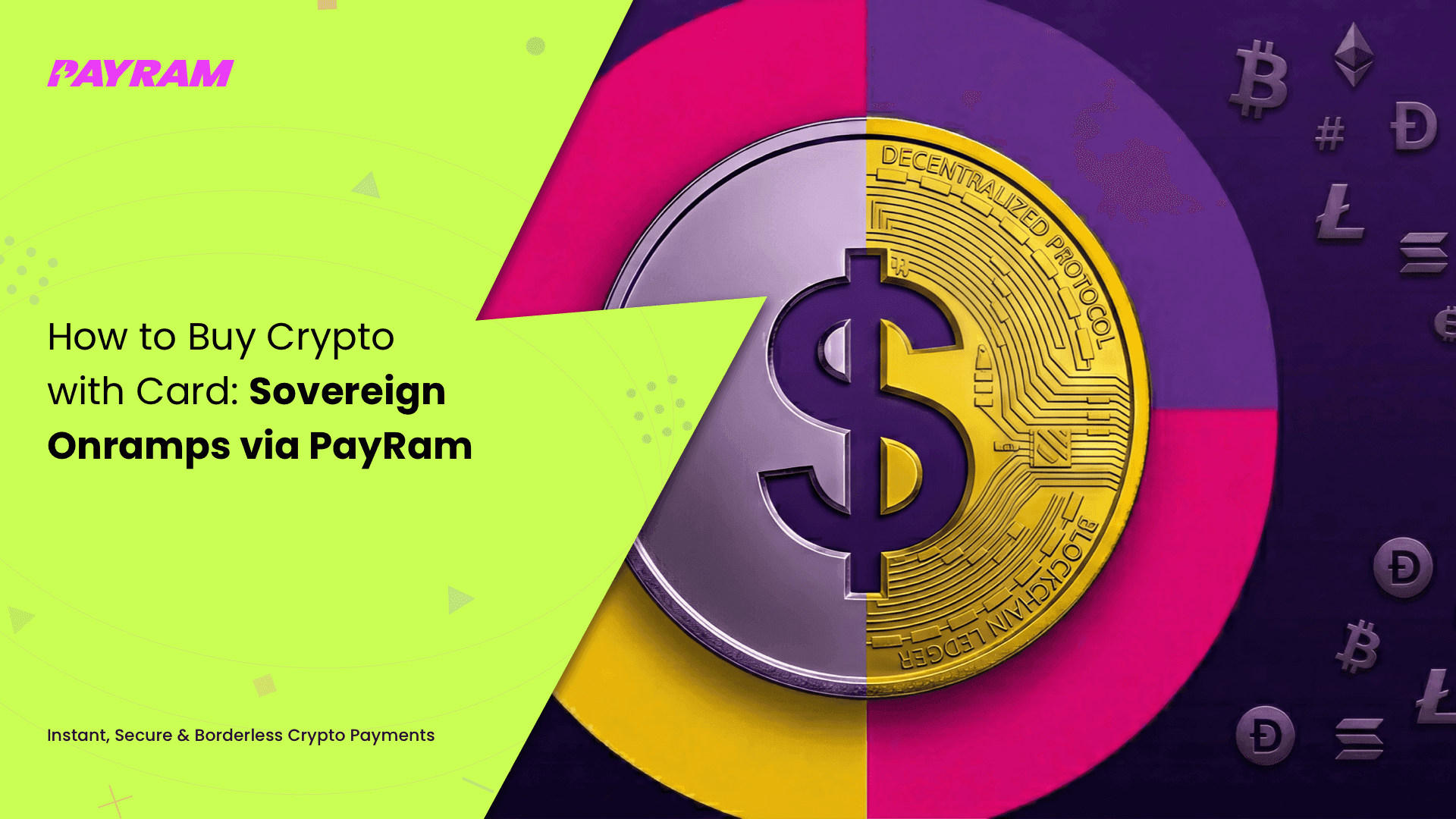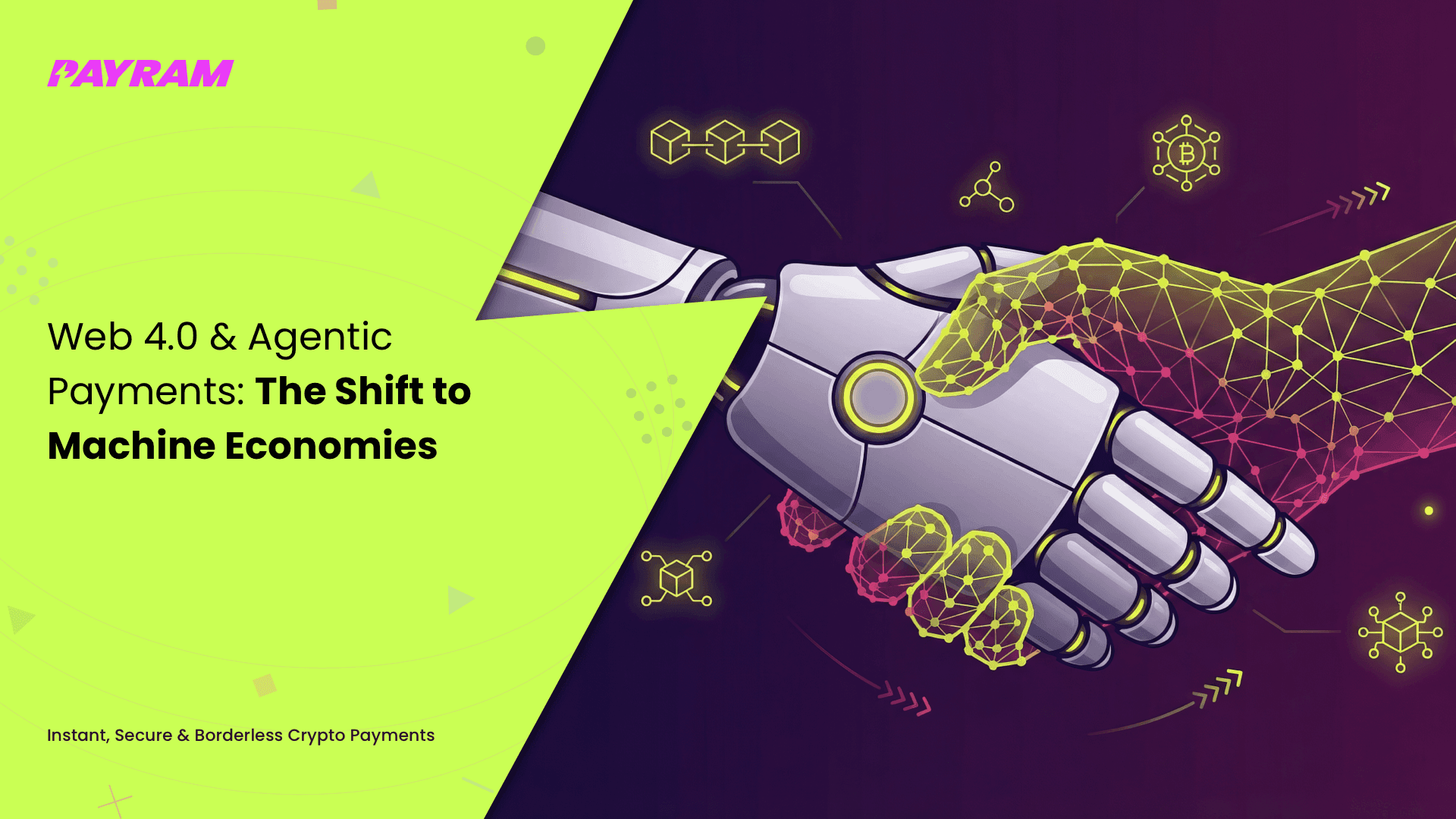
July 18, 2025
PayRam vs. Coinbase Commerce: Which is Right for Your Business in 2025?
When you’re choosing a crypto payment processor for your business, you face a critical question, one that goes far beyond simple features and fees. You must ask yourself: am I looking for a simple button to put on my website, or am I building a financial fortress to protect my revenue?
This isn't just a philosophical exercise. The answer will determine who truly controls your money, how much you pay in fees, and—most importantly—whether your entire business can be shut down overnight without warning.
On one side, you have established players like Coinbase Commerce, offering a familiar, enterprise service. On the other, you have a new generation of powerful, sovereign infrastructure like PayRam, designed for businesses that value freedom and control..
While both platforms allow you to accept cryptocurrencies like Bitcoin (BTC) and Ethereum (ETH), they are built on fundamentally different philosophies. Their approach impacts everything: your fees, your control over your funds, and your freedom to operate without fear of being de-platformed.
This comprehensive guide will provide a direct, honest comparison of PayRam vs. Coinbase Commerce. We will dissect the crucial differences to help you decide which platform aligns with your business's core needs for control, cost, scalability, and long-term survival.
PayRam vs. Coinbase Commerce: The Core Differences at a Glance
Before we dive deep, let's start with the fundamental distinctions that define these two platforms. This isn't just a feature list; it's a summary of two opposing approaches to crypto payment processing.
- Hosting Model: PayRam is self-hosted, meaning the software runs on your own server, under your complete control. Coinbase Commerce is hosted, meaning you are using their platform and are subject to their rules and infrastructure.
- Fundamental Control: With PayRam, you have absolute sovereignty. You control the software, your keys, and the rules. With Coinbase Commerce, you are a guest on their platform. They can terminate your account at any time if your business is deemed to be in violation of their ever-changing terms of service.
- Censorship Resistance: PayRam is inherently censorship-resistant. Because you own the infrastructure, no third party can freeze your funds or shut you down. Coinbase Commerce, as a centralized US company, has low censorship resistance and must comply with restrictive banking policies, which often leads to account closures for many legitimate businesses.
- Target Audience: PayRam is purpose-built for businesses that traditional finance deems "high-risk," such as iGaming, online casinos, adult entertainment, and global e-commerce. Coinbase Commerce is designed for mainstream, low-risk, US-centric businesses that fit neatly inside the traditional financial system's comfort zone.
- Fee Structure: PayRam offers 0% payment processing fees. Core payment acceptance is free. Fees only apply for optional, advanced services like automated fund orchestration and wallet sweeping, which can range up to 5%. Coinbase Commerce charges a mandatory 1% transaction fee on every single payment you receive.
- KYC/KYB Requirements: As PayRam is a self-hosted solution, you require no approvals to use the software, unlocking true financial privacy. Coinbase Commerce requires mandatory, comprehensive business verification to use their service.
- Fiat Settlement: PayRam is a pure crypto-to-crypto solution. However, integrated On-Ramp and Off-Ramp services are coming soon to provide streamlined fiat conversion options directly within the platform. Coinbase Commerce offers settlement to fiat currencies (like USD), but this requires a fully verified Coinbase account.
- Ease of Installation: PayRam features a streamlined, UI-based installation and configuration, eliminating the need for command-line expertise for core setup. Coinbase Commerce offers a standard SaaS (Software as a Service) signup process.
Now, let's explore what these differences really mean for your business.

The Bedrock Difference: Sovereign Infrastructure vs. Rented Service
The most critical distinction between PayRam and Coinbase Commerce is the hosting model. This single factor dictates your level of freedom, security, and control.
Imagine you're a retail merchant. You have two choices: you can buy the land and build your own store, or you can rent a small kiosk inside a giant mall.
PayRam is the equivalent of owning your land and building your own store. It is a self-hosted crypto payment gateway. The software runs on your own server—whether it's a cloud instance or hardware in your office. You own the infrastructure. You set the rules. You are the sovereign ruler of your financial domain. No one can evict you, no one can tell you what you can or cannot sell, and no one can lock the doors to your own vault.
"For any serious online business, especially in a globally competitive or high-risk vertical, relying on a third-party hosted payment service is the equivalent of building your castle on rented land. True resilience only comes from owning your core infrastructure." - Blockchain Infrastructure Analyst
This model is the ultimate defense against de-platforming. Businesses in the iGaming and adult entertainment sectors know this pain all too well. They can be operating legally and successfully one day, only to receive an email from their payment processor stating their account has been terminated, often with funds frozen for 180 days. With a self-hosted solution like PayRam, this is impossible. You are in control as you own the infrastructure.
Coinbase Commerce, on the other hand, is the kiosk in the mall. While the mall owner (Coinbase) makes it easy to set up your shop, you are ultimately a tenant. You must abide by their rules, which can and do change. The mall has security guards (their risk and compliance teams) who can shut you down at any moment, for any reason they deem necessary, often without appeal.
This "rented service" model is convenient for low-risk businesses that have no fear of being shut down. But for any entrepreneur who values independence or operates in a non-traditional industry, this convenience is a ticking time bomb.
Who Is It Built For? The High-Risk vs. Mainstream Divide
A tool is only as good as its suitability for the job at hand. A hammer is a poor choice for driving a screw. Similarly, a payment processor built for mainstream retail is a disastrous choice for a high-stakes online casino.
PayRam is the specialist's tool, forged in the fires of high-risk commerce.
We built PayRam with a deep understanding of the unique challenges faced by industries that traditional finance has abandoned. We speak fluent iGaming, online casino, global marketplace, and e-commerce. We know that for these businesses, payment processing isn't a simple utility; it's a constant battle for survival.
According to a 2024 payments industry report, merchants in high-risk categories face account freezes or closures at a rate nearly 30 times higher than those in standard retail categories.
Our platform is engineered to solve their biggest problems:
- Eliminating Fraudulent Chargebacks: In sectors like online gaming and digital goods, chargeback fraud is rampant. The irreversible nature of blockchain transactions on PayRam eliminates this billion-dollar problem entirely. You can learn more about how to permanently eliminate fraudulent chargebacks here.
- Ensuring Business Continuity: We provide the tools for businesses to operate freely and globally, without fear that a successful marketing campaign will trigger a risk algorithm and get their account shut down. This is the core promise of our High-Risk Merchant Survival Guide.
- Global Reach: For businesses with customers around the world, PayRam provides a borderless payment rail, allowing you to accept payments from anyone, anywhere, without dealing with complex cross-border banking fees or regulations.
Coinbase Commerce is a generalist's tool, designed for the mainstream.
Coinbase's primary business is being a regulated, publicly-traded US cryptocurrency exchange. Their payment processing arm, Coinbase Commerce, is an extension of this identity. It is designed to serve businesses that are low-risk, easily understood by traditional underwriters, and comfortable operating entirely within the US regulatory framework.
They are not built to handle the complexities or regulatory nuances of global iGaming, the unique content challenges of the adult industry, or the fast-moving world of international dropshipping. Attempting to use their platform for these purposes is not a matter of if you will be shut down, but when. If you are looking for a true Coinbase Commerce alternative that understands your business model, you need a specialist.
The Fee Structure: 0% Processing vs. a 1% Transaction Tax
This is perhaps the most misunderstood—and most powerful—difference between the two platforms.
PayRam believes that accepting a payment should be free. It is your money.
Our philosophy is simple: we provide the core infrastructure for payment processing at 0% fees. You can install PayRam, integrate it with your website, and accept payments in USDT, Tron (TRX), or Solana (SOL) without paying us a single cent in processing fees.
So, how do we make money? We charge for optional, advanced services that automate and scale your financial operations. Think of it like this: the foundational highway is free to use. You only pay for the high-speed express lanes and automated toll booths if you need them.
These advanced services include:
- Automated Fund Orchestration: For businesses handling thousands of deposits, manually managing funds is impossible. Our orchestration service can automatically sweep funds from thousands of deposit addresses into your main wallet, saving you immense time and labor.
- Advanced Node Management: We can provide and manage dedicated nodes for enhanced performance and reliability.
- Sophisticated Routing and Sweeping Rules: Our services allow you to create complex rules to minimize network fees, auto-convert funds, and manage your treasury with precision.
These services carry fees that can go up to 5%, but only if you choose to use them. You are in complete control of your costs. You can start for free and only pay for automation as your business scales.
Coinbase Commerce charges a mandatory 1% tax on all your revenue.
Coinbase's model is the opposite. They charge a flat 1% fee on every single transaction that passes through their system. It doesn't matter if it's a $10 payment or a $10,000 payment. It doesn't matter if you're a small charity or a massive enterprise. You are paying a 1% tax on your gross revenue for the privilege of using their platform.
"A 1% mandatory fee might seem small, but for a business with a 10% profit margin, it represents a shocking 10% of their bottom line. Over a year, this 'small' fee can be the difference between reinvesting in growth and struggling to stay afloat." - E-commerce Profitability Consultant
Let's do the math. If your business processes $500,000 a month:
- With Coinbase Commerce, you pay $5,000 per month ($60,000 per year) in mandatory fees.
- With PayRam, if you only use the core payment processing, you pay $0.

The choice is clear. Do you want free infrastructure with optional, value-added services you can choose to pay for? Or do you want to pay a mandatory tax on every dollar your business earns?
Installation and Control: The Myth of Complexity
For years, the biggest argument against self-hosting has been complexity. The perception was that you needed a team of developers and deep command-line expertise to run your own server. This might have been true in the past, but it is a myth today.
PayRam was engineered for power and simplicity.
We have shattered the complexity barrier with a streamlined, user-friendly, UI-based installation and configuration process. From the moment you begin, you are guided by a clean, intuitive interface. You can configure your wallets, set up your accepted cryptocurrencies, and manage your settings without ever needing to open a command-line terminal or manually edit a configuration file.
This innovation makes the power of self-hosting accessible to a much broader range of users. Whether you're a solo entrepreneur who is moderately tech-savvy or a business with a dedicated IT team, setting up PayRam is a straightforward process designed to get you from zero to accepting payments in the shortest possible time. You can learn more about our commitment to user-friendly sovereignty in our guide to self-hosted crypto payment gateways.
This approach gives you the best of both worlds: the absolute, granular control that developers crave, with the intuitive user experience that business owners need. For a deep dive into how we compare with other self-hosted options, see our PayRam vs BTCPay Server article.
Coinbase Commerce, being a standard SaaS product, offers a simple signup form on their website. This is undeniably easy, but this ease comes at the cost of every point of control we've discussed. It's a trade-off between five minutes of setup convenience and a lifetime of sovereign control over your business's finances. With PayRam's UI-driven approach, that trade-off is no longer necessary.
Privacy and Data: The KYC/KYB Divide
In today's digital world, data is power. The question is, who holds that power—you or your payment processor?
PayRam is a No-KYC platform. Your business is your business.
We believe in the foundational principles of cryptocurrency: privacy and self-sovereignty. To use PayRam, you do not need to provide us with sensitive personal or business documents. You don't need to ask our permission to operate. You simply install the software and begin accepting payments. Your data, your customers' data, and your transaction history remain on your server, under your control. This is essential for businesses operating in jurisdictions with complex privacy laws or for those who simply believe that their financial information should remain private. For more on this, it's important to understand how to navigate compliance in a self-hosted environment.
Coinbase Commerce requires mandatory, full-stack business verification.
As a regulated US entity, Coinbase has no choice but to enforce strict KYC/KYB protocols, as outlined by financial authorities like FinCEN. To use their service, you must submit your business formation documents, personal information of the business owners, and be prepared to answer detailed questions about your business model.
You are effectively handing over the keys to your financial kingdom and trusting that they will a) approve you, and b) never use that information against you. For thousands of legitimate businesses, this is a non-starter.
The Final Verdict: Which Platform Should You Choose?
The decision between PayRam and Coinbase Commerce is not a simple feature comparison. It is a strategic choice about the foundation upon which you will build your business.

Choose Coinbase Commerce if:
- You are a mainstream, low-risk business based in the United States.
- You are not concerned about the 1% transaction fee on all revenue.
- You prioritize a familiar, quick signup process above all else and are comfortable with the risks of a hosted platform.
- You require direct fiat settlement and are willing to undergo a full KYB process to get it.
Choose PayRam if:
- You operate in a high-risk industry like iGaming or global e-commerce and need a payment solution that is immune to de-platforming.
- You believe you shouldn't have to pay a tax on every transaction and prefer a model with 0% processing fees and optional paid services.
- You prioritize absolute control, privacy, and ownership of your financial infrastructure.
- You are looking for a powerful, developer-friendly, and fully sovereign Coinbase Commerce alternative.
Frequently Asked Questions (FAQs)
1. Is self-hosting with PayRam difficult for a non-technical person?
No. While self-hosting is inherently more involved than signing up for a SaaS website, PayRam has been designed with a streamlined, UI-based installation. This eliminates the need for complex command-line work for the core setup, making it accessible to a wide range of users. Our documentation provides clear, step-by-step guides.
2. What are the "orchestration services" that PayRam charges for?
Orchestration refers to the automated management of funds. For a business receiving hundreds or thousands of payments daily to unique deposit addresses, manually consolidating those funds into a main wallet is impractical. Our orchestration services automate this "sweeping" process, saving significant time and reducing the chance of human error. Learn more about how we handle transactions in our guide to crypto casino finality.
3. If I use PayRam, how do I convert my crypto to fiat currency?
PayRam gives you flexible options. As a self-custody solution, you can always move your crypto to a third-party service like an exchange or OTC desk for conversion. However, to make this process seamless, we are excited to announce that integrated Off-Ramp services are coming soon. This future update will allow you to convert your crypto to fiat directly from the PayRam platform, combining sovereign payment processing with streamlined access to traditional currency.
4. Can my PayRam account be frozen or shut down?
No. This is the core benefit of a self-hosted architecture. Because the software runs on your server and you control the private keys, there is no central "PayRam account" for us to freeze or shut down. You are in complete control. We cannot touch your funds or stop you from processing payments. This is what we mean by The Unbannable Gateway.
5. How does PayRam handle security if it's self-hosted?
PayRam is built on a "no keys on server" architecture. Your private wallet keys are never stored on the payment server itself. The server only needs your public wallet address to generate deposit addresses. This means that even in the unlikely event your server is compromised, your funds remain secure in your own wallet. Learn more about securing your funds with our multi-sig fortress guide.
6. What is the real difference between a non-custodial wallet and a self-hosted gateway?
A non-custodial wallet is where you hold your own keys. A self-hosted gateway is the software that interacts with your wallet to process payments. Coinbase Commerce is non-custodial in that they don't hold your funds, but they are not self-hosted—they control the gateway software. PayRam provides you with the self-hosted gateway software to connect to your own non-custodial wallet, giving you end-to-end control.
7. Does Coinbase Commerce work for iGaming or online casinos?
Generally, no. Coinbase's terms of service and risk policies are aligned with US regulations, which are highly restrictive toward online gambling. Many operators who have tried to use their service have faced swift account termination. You can read more in our guide for crypto casino operators.
8. What kind of support does PayRam offer?
We offer comprehensive documentation for self-service, as well as dedicated, paid support plans for businesses that require hands-on assistance, integration support, and priority service.
9. Can I accept stablecoins like USDT with PayRam?
Yes. PayRam has robust support for major stablecoins, including USDT on various networks like Tron (TRX). Stablecoins are crucial for mitigating volatility, and you can learn more about managing them in our Ultimate Stablecoin Corridor Guide.
10. How does self-hosting affect compliance with regulations like the FATF Travel Rule?
This is a critical topic. While self-hosting gives you autonomy, it doesn't make you exempt from regulations in your jurisdiction. PayRam is developing tools to help merchants manage compliance in a sovereign way. You can read our deep dive on this in The FATF Travel Rule Explained: A Merchant's Guide to Compliance.
Take the Next Step Towards Financial Sovereignty
The choice is clear. If you want a simple button and are willing to pay the 1% tax and accept the risk of being de-platformed, a hosted service might suffice.
But if you are building a serious business for the long term—a business that requires stability, control, and the freedom to operate without fear—then you need to build it on a foundation you own. You need to build it on PayRam.
Your business deserves a payment partner, not a parole officer. If you've been burned by frozen funds or sudden bans, let's talk about building a payment system you can trust. Schedule a Free Stability Consultation
Ready to see how simple a powerful, self-hosted solution can be? Dive into our documentation and explore the API. Explore Our Developer Docs & API Reference




